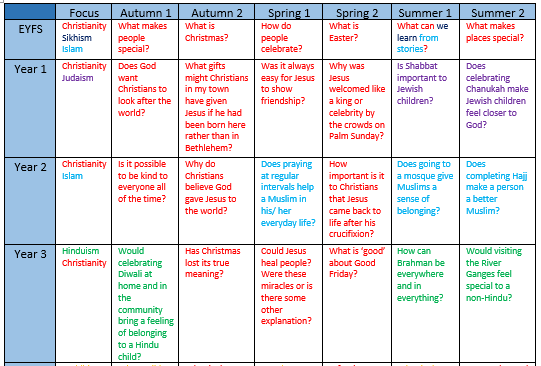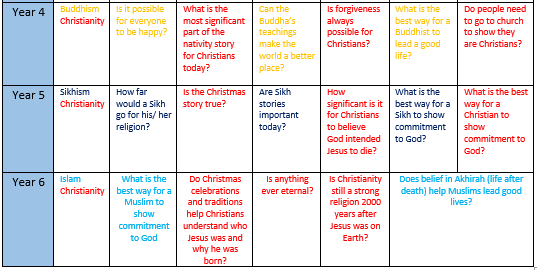RE
RE Curriculum
At Templars, we are committed to creating a school where each child is valued and feels a deep sense of belonging within the Templars’ community. We work hard to make sure that our curriculum reflects our learners and their reality; this makes learning at Templars dynamic, diverse and valuable. The curriculum we present has been carefully crafted to ensure our learners are best prepared for the world around them – Tile Hill, Coventry and beyond. This is because we want our children to be kinder, fairer, braver and better people; we want them to achieve these qualities as our modern world demands this of them. Our children are the future of their communities and we are passionate about ensuring that they are ready for this responsibility.
An overview of our RE Curriculum
At Templars, we deliver the Discovery RE curriculum. This detailed curriculum – that encompasses Foundation Stage to Year 6 – is an enquiry-based approach which is led by a different enquiry each half term with each focusing upon one religion at a time. Across a child’s learning journey at Templars, they will learn through six annual enquiries which focus upon Buddhism, Hinduism, Islam, Judaism or Sikhism. Christianity is covered each year, specifically around the key festivals of Christmas and Easter. This is structured within the following yearly overview:


Why have we chosen to deliver Discovery RE?
We want our children to be able to enjoy being with different kinds of people. In order for them to achieve this, we have a responsibility to provide our children with the opportunities to understand and appreciate others in order to promote wider tolerance and social cohesion. We believe our enriching RE curriculum is integral to accomplishing this at a level where our children are both confident, independent thinkers whilst holding an intrinsic respect for the thoughts and beliefs of others and are prepared for the complex world around them. We feel that successful RE learning has the potential to have a significant impact upon our pupils’ personal development and the enquiry-based learning of Discovery RE promotes active engagement in questioning, discussing and debating.
Discovery RE’s main aim is ‘to deepen children’s critical thinking skills through greater subject knowledge and also to allow their own spiritual development’. We have chosen Discovery RE as we feel that its aim reflects our ambition to maximise children’s personal development and also shares our core school values of care, respect and honesty. Through empowering children with knowledge of religious beliefs and building this through key questions and enquiries, our learners are able to better understand others which we know will support them to make more informed, conscious choices about how they can treat others respectfully.
Our school values of care, respect and honesty are further reflected in the chosen units within Discovery RE and the delivery of these supports our wider PSHE and personal development curriculum. For example: in the first Year 4 enquiry focused upon ‘Is it possible for everyone to be happy?’, children discover the Buddhist view on happiness through evaluating what makes them happy, engaging with music and stories and discussing when happiness is more challenging. Within this enquiry, children will learn to appreciate, value and respect differences in opinions after being challenged to be honest about their personal feelings about the concept. After learning about this within the context of Buddhism, children have to reflect on how they can care for others by trying to help people be happy rather than causing hurt and how this, in turn, may help themselves to be happier. We believe that all of the Discovery RE enquiries reinforce our school values positively and allow our children to see the wider application of them within society.
Our RE (and PHSE) curriculum are distinct from our other curricula and the knowledge-based approach. This is purposeful. We feel that we need a space in the curriculum to learn in a different way and that there are great benefits in an enquiry-based curriculum in both RE and PSHE. This different pedagogical approach gives space for discussing, sharing, comparing and contrasting their lives with others. We feel that this enquiry-led learning will support our children to be equipped with the accurate information required to enable them to think critically, question sensitively and evaluate thoroughly the ideas that are presented to them before being able to relate knowledge to their own personal knowledge and experience. Despite its different approach, we feel that our RE curriculum is complementary to our knowledge curriculum. The planning provides knowledge, fluency and depth within each enquiry – this mirrors our approach in our wider curriculum.
The use of the Discovery scheme gives confidence to teachers – they do not need to worry about keeping balance of and within the curriculum. The scheme lends itself to being blocked, which we know can be powerful when delivering in-depth studies of enquiries. We can then supplement these enquiries with regular retrieval across the year and year groups to ensure long-term learning. The Discovery scheme also offer the flexibility to respond to our school context and wider curriculum as we could select enquiries that work best for us, for example, we have chosen a focus upon Islam because this reflects the highest proportion of observed religions within school.
Through Discovery RE’s carefully sequenced enquiries, the children discover commonly agreed and established facts which support the children’s development of religious understanding, for example how people express their religion and religious artefacts or texts. The enquiry-based learning of Discovery RE then promotes understanding for where this knowledge was established, evaluates it and illustrates how it continues to be adapted within the complex, modern world. For example: within the Year 6 enquiry focused on ‘Is anything ever eternal?’, children determine what Christian’s believe around eternity, particularly in relation to unconditional love and forgiveness. This enquiry is formed around the big idea within RE that people should aim to live a good life and challenges the children to establish what this looks like in reality. By evaluating what Christians believe and being introduced to alternative beliefs in this area (humanism), children are asked to justify why living a good life is important and how this could be achieved.